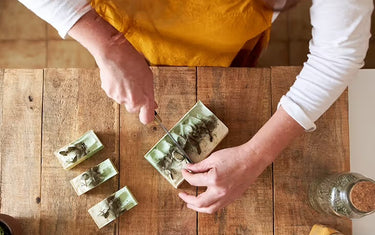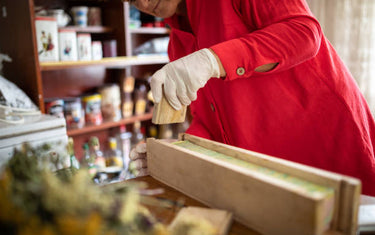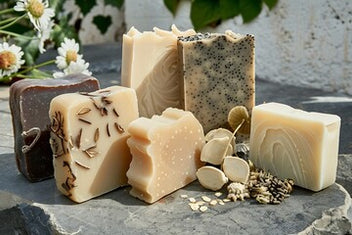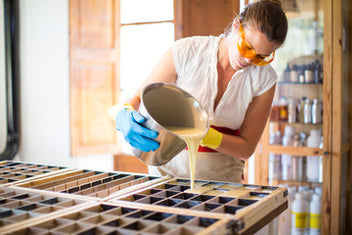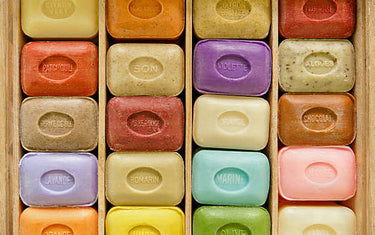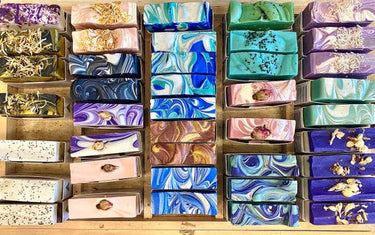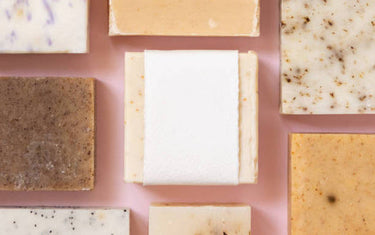6 min read / 1 October 2024 / yasmin sharp
1. Introduction to Soap Making
Discover the history, process, and modern trends in soap making. Learn about ingredients, methods, market insights, and the benefits of homemade soap.
Share this post
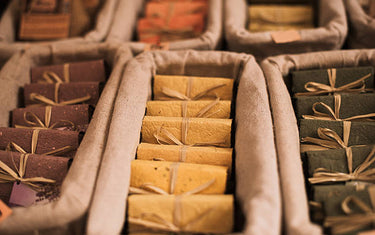
Soap has evolved considerably throughout history, with almost 340 million units of liquid soap flying off shelves in the U.S. alone in 2022.
Understanding the history of soap making and its modern context offers valuable insights into a product that has become a staple in many of our lives.
Below, we’ll delve into the history of soap making and soap origins, including its ancient beginnings, evolution, and current trends.
Whether you're a history buff, a DIY enthusiast, or someone interested in the science behind what soap is made of, this comprehensive guide provides a detailed look into the world of soap.

History of Soap Making
Ancient Beginnings
The history of soap making stretches back thousands of years, with evidence of early soap-like materials found in ancient civilisations such as Babylon, Egypt, and Rome. So, when was soap invented?
The origin of soap is often traced to around 2800 BC in ancient Babylon, with records suggesting the use of a soap-like substance made from fats boiled with ashes. While it's difficult to pinpoint exactly who invented soap, many historians credit the ancient Babylonians as the first to develop a soap-like material for cleaning purposes.
In ancient Egypt, soap was made using animal fats and plant oils mixed with alkaline salts. This mixture was primarily used for washing wool and cotton in textile production, as well as for medicinal purposes. The Egyptians also utilised soap for personal hygiene, a practice that laid the groundwork for modern soap making.
The Romans further advanced the art of soap making. They created soap from tallow (animal fat) and wood ashes, which they used for bathing and washing.
Medieval and Renaissance Periods (476 AD - 1500 AD)
During the medieval period, soap making in Europe advanced. Soap was still primarily made from animal fats and ashes, but the processes became more sophisticated.
The Renaissance period saw soap becoming more widespread across Europe, with cities like Marseille in France and Savona in Italy becoming well known for their high-quality soaps.
It was during this time period soap became recognised not just for its cleaning properties, but also for its role in improving health and hygiene. Its use helped to reduce the spread of diseases and contributed significantly to public health.

A factory in the Paris area making Tallow Soap by boiling it and putting it into moulds.
Industrial Revolution (1760 - 1840)
The Industrial Revolution has a big impact on soap history. With industrialisation came the ability to mass-produce soap, making it more accessible and affordable to the general population.
The introduction of commercial soap brands revolutionised the market. Companies like Lever Brothers (now Unilever) in the U.K. and Procter & Gamble in the U.S. began producing soap on a large scale.
The industrialisation of soap production involved the use of new ingredients and techniques.
Sodium hydroxide (caustic soda) replaced traditional alkaline ashes, and the continuous process method meant that soap making could be more efficient. This period also saw the rise of branded soaps.

What Is Soap Made Of?
Soap is typically made from a combination of fats or oils, water, and an alkali such as sodium hydroxide.
The fats and oils, which can come from animal or plant sources, react with the alkali in a process called saponification to produce soap and glycerin.
Essential oils for soap making are often added to provide natural scents, while other additives like colourants, herbs, and exfoliants can add to the soap’s appearance and benefits.
Understanding how soap is made is crucial for both commercial manufacturers and home crafters, as the process involves careful measurements and precise chemical reactions.
Modern soaps may also include preservatives and stabilisers, but many artisanal soaps focus on natural ingredients for a more organic product.
Modern Uses of Soap
Soap has become an integral part of our everyday lives, and thanks to advancements in technology, there are now several modern uses of soap. Let’s take a look at some of the most common below.
Personal Hygiene
Today, soap is an essential product for personal hygiene. There are various types of personal soaps, including bar, liquid, and antibacterial soaps, with each catering to different preferences and needs.
Bar soaps are popular thanks to their convenience and long-lasting nature, while many people like liquid soaps for their ease of use and sanitary dispensing. Antibacterial soaps, although controversial, are designed to reduce or eliminate bacteria on the skin.
Cosmetic and Skincare
The cosmetic and skincare industry makes specialised soaps to address different skin types and conditions, from dry and sensitive skin to oily and acne-prone skin.
These soaps often incorporate natural and organic ingredients such as essential oils, herbs, and botanicals to provide added benefits and cater to the growing demand for eco-friendly products.
Today, you will also find carrier oils for soap making are prevalent within the industry.
Industrial and Household Uses
Beyond personal care, many of us use soap for industrial and household applications.
Industrial soaps are used in cleaning and maintenance industries for their effectiveness in removing grease, oils, and other contaminants.
In households, soaps are employed for washing dishes, laundry, and general cleaning tasks.
Environmental considerations have also led to the development of eco-friendly soap options. These include biodegradable soaps and those made with sustainably sourced ingredients and minimal packaging.

Market Trends in Soap Making
Consumer Preferences
Like many other markets, consumer preferences for soap are continually changing.
For example, demand is increasing for natural and organic soap products. This is because many consumers want to know more about the ingredients in their personal care items.
Current soap trends also highlight a growing interest in eco-friendly packaging and unique scent combinations, reflecting a shift towards sustainability and personalisation in personal care.
Sustainability Trends
Sustainability is a major trend in the soap industry. Eco-friendly packaging, such as biodegradable and recyclable materials, is becoming more common.
Sustainable sourcing of ingredients is also a priority, with many brands committing to ethical practices and supporting fair trade.
Technological Innovations
Modern equipment and techniques have made it easier to produce high-quality soaps efficiently.
Innovations such as cold process and hot process methods, as well as advanced moulding and cutting tools, mean soap makers can produce a wider range of different products.
Technology has also influenced the design of soaps, allowing for intricate patterns and customisation.
Economic Impact
As for the economic impact of soap, market trends indicate steady growth, driven by increasing consumer awareness and demand for hygiene products.
For small-scale and homemade soap businesses, there are numerous opportunities to cater to niche markets and offer unique, high-quality products.
However, smaller business owners may face challenges such as competition and regulatory compliance.

Benefits of Homemade Soap
Customisation
One of the primary benefits of homemade soap is the ability to tailor ingredients to specific needs and preferences.
Homemade soap makers can experiment with different oils, fragrances, and additives to create personalised products that cater to individual skin types and conditions.
Quality Control
Making soap at home means you have strict quality control.
You can ensure that you only use high-quality, safe ingredients and avoid harmful chemicals and synthetic additives often found in commercial products. This control means you can create a “purer” natural soap.
Creative Expression
Soap making is not just a practical activity; it allows you to get creative and innovate.
Soap makers can experiment with colours, shapes, and textures to produce unique and aesthetically pleasing products.
For many people, this creative aspect makes soap making a rewarding and fulfilling hobby.

In Summary
Understanding the history of soap making will help you understand its significant role in personal and public health.
Today, soap making continues to evolve, driven by consumer preferences, sustainability trends, and technological innovations.
Using this knowledge, you can apply it in your own soap making practices.
Need soap making supplies for a discount? You can get access to exclusive money-saving deals on our range of essential and fragrance oils by signing up for a Nikura wholesale account.


